
The exhibit is open to the public 9am to 5pm weekdays
Location: Allen House on the UMass Lowell South Campus (2 Solomont Way, Lowell, MA, 01854)
Parking: UMass Lowell Visitor Parking Metered Lot at the corner of 61 Wilder Street and Bachelder Steet, Lowell, 01854
Further inquiries or information, send email.
Jack Kerouac lived at dozens of addresses — in Lowell, Massachusetts, where he was born and grew up, but also in New York City, Grosse Pointe, San Francisco, Mexico City, Orlando, Cape Cod, and St. Petersburg, Florida, where he died in 1969. Even as he kept on the move, Kerouac in his final years returned to Lowell at various times. In 1966, he married Lowell-native Stella Sampas, the sister of his close childhood friend from Lowell, Sebastian Sampas. He also visited and lived in the city intermittently throughout the 1960s and frequently wrote about his Lowell youth during those years in his late novel Vanity of Duluoz (1968) and unpublished work. Lowell was often Kerouac’s starting place and his end point.
In the exhibit “Kerouac Retrieved” many of Kerouac’s belongings from his last home in St. Petersburg, Florida — his desk and desk chair, his Lowell Tech windbreaker, his handmade cat carriers, and other personal items — return to Lowell, gifts to the University of Massachusetts Lowell from John Sampas, the executor of the Kerouac Estate.
Items from the John Sampas Collection are on display at the university’s historic Allen House on South Campus on weekdays, 9am-5pm. Please join us for this free exhibit. Directions, parking, and further information are available here. Information about additional UMass Lowell Kerouac Center events this fall is available here.
Please also scroll down to see images related to the exhibit, as well as additional photographs of Jack and his family owned by John Sampas. This exhibit is made possible by John Sampas, the Jack and Stella Kerouac Center for the Public Humanities, the UMass Lowell English Department, and the College of Fine Arts, Humanities, & Social Sciences, as well as UMass Lowell. The physical exhibit is designed by Proun Design Exhibit Design and Consulting.

Jack’s last house at 5169 10th Ave. North, St. Petersburg, Florida. Jack, his wife Stella, and Jack’s mother, Gabrielle, moved to the Florida house in 1966. On the evening of October 20, 1969, Jack collapsed in the bathroom and died the next day of an abdominal hemorrhage. In September 2013, members of the UMass Lowell English Department visited the house with its current owner John Sampas, who donated articles from the home for this exhibit.
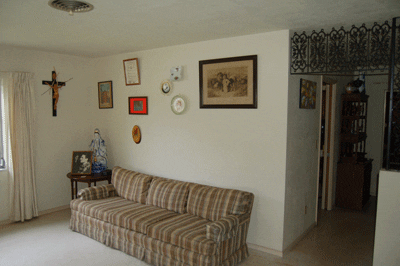
The modest living room of the St. Petersburg house. Jack and Stella lived among an eclectic collection of pop-culture souvenirs, sentimental keepsakes, and religious iconography from various traditions (Catholic, Buddhist, Hindu). Many of these objects are included in the exhibit.
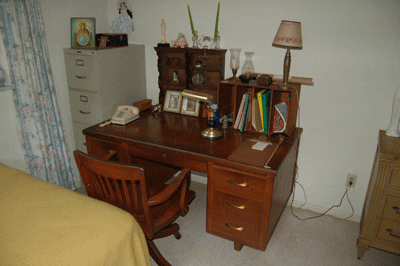
Jack’s writing desk in his bedroom of the St. Petersburg house. He wrote Vanity of Duluoz, the late unfinished work “Beat Spotlight,” and a wealth of correspondence at this desk. “Beat Spotlight” is quoted at length in this exhibit, as is Kerouac’s unpublished novel, “Memory Babe.”
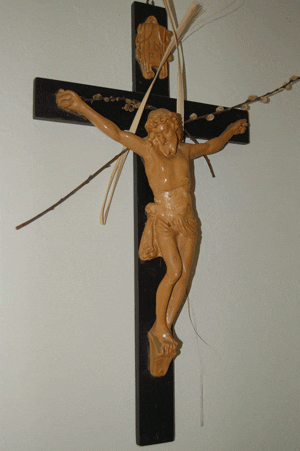
A close-up of Jack and Stella’s crucifix, hanging on the living room wall (see previous image).
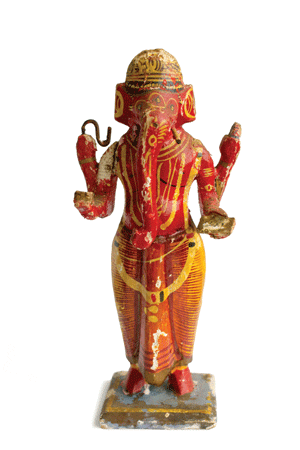
Jack’s wood-carved Ganesha figure, from India. The Sampas gift to the university includes 38 small decorative objects, among them this Hindu Ganesha statue and the two artifacts immediately below. These objects express many of Jack’s interests and experiences, especially with Eastern and Western religion and travel.
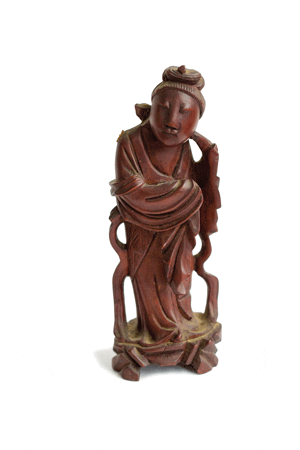
Jack’s wood-carved Quanyin figure, from China. Quanyin is a bodhisattva associated with mercy and compassion.
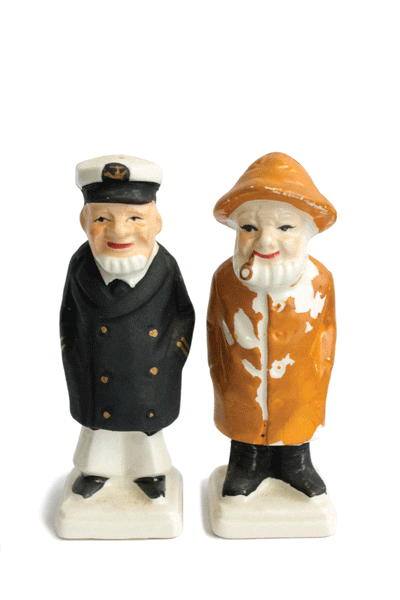
Pottery salt and pepper shakers — a ship’s captain and a fisherman.
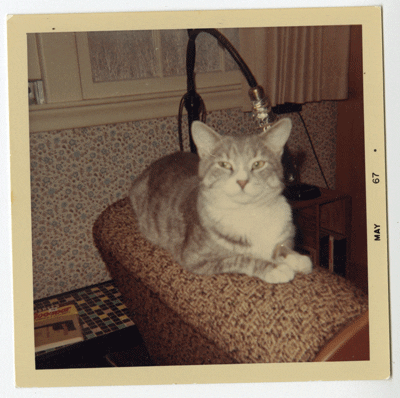
Jack’s cat Pitou, or “little one,” in May 1967. Pitou died on June 12, 1967, and in a journal entry from October of that year, Jack says, “I still mourn Pitou.” Photograph courtesy of John Sampas.
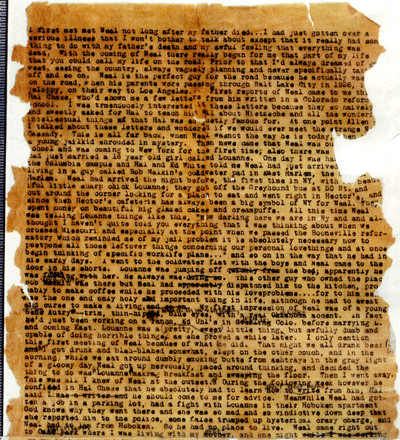
The first “page” of the “On the Road” scroll, 1951. The typewriter was essentially important to Jack’s creative process. The philosopher Friedrich Nietzsche notes, “Our writing tools are also working on our thoughts,” and it’s interesting to consider the ways Jack’s modes and technologies of composition shaped his ideas. A larger image of this portion of the scroll is available here. Photograph courtesy of John Sampas. The physical scroll manuscript is owned by James Irsay.
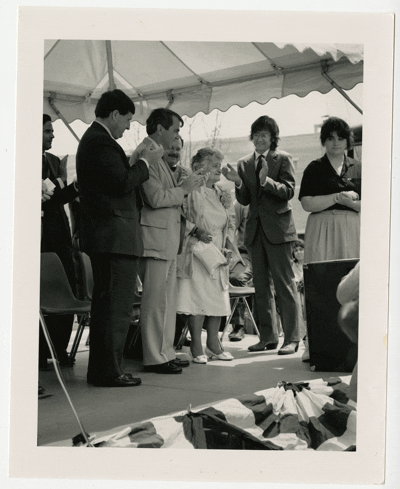
Stella with U.S. Senator Paul Tsongas (tan suit) in 1988 at the dedication of the Kerouac Park and Commemorative in Lowell. Photograph courtesy of John Sampas. The photographer is James Higgins.
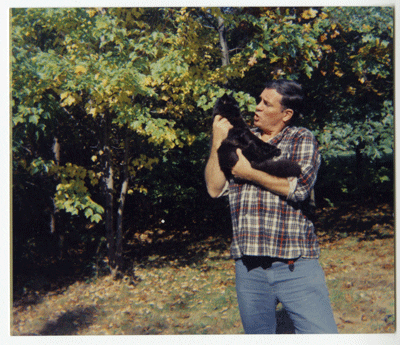
Jack with one of his cats, circa 1968. Jack’s three cats were very important to him, and he had wood-and-wire cat carriers handmade for each cat. He wrote their names on each carrier — Pitou, Dobie, and Timmy. The cat carriers are included in the exhibit. Photograph courtesy of John Sampas.
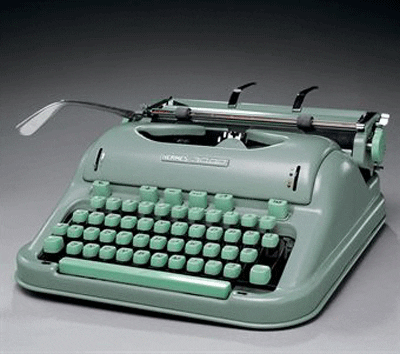
Jack’s last typewriter, a Swiss-made Hermes 3000 that was sold at auction in 2010. The “Kerouac Retrieved” exhibit includes a Hermes 3000 nearly identical to Jack’s, and visitors are encouraged to type out their own observations and messages.
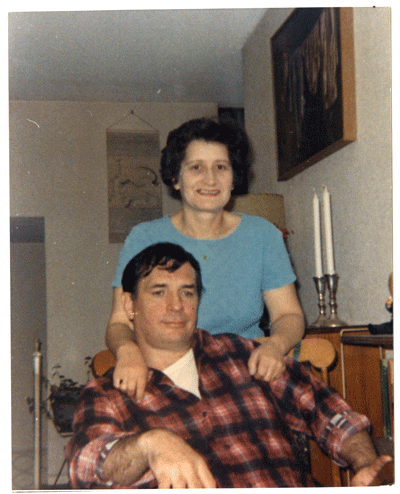
Jack and Stella in 1967. This wood rocking chair — made in Massachusetts in 1960 — traveled with Jack to Florida and is now part of the UMass Lowell Kerouac collection. Photograph courtesy of John Sampas.

Jack looking happy on a snowy day. Photograph courtesy of John Sampas.

